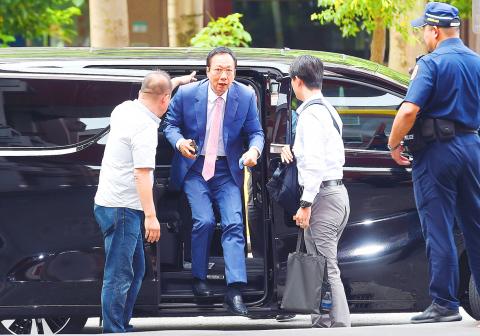Chinese Nationalist Party (KMT) Legislator Wang Jin-pyng (王金平) will be key to the party winning next year’s presidential election, Hon Hai Precision Industry Co founder Terry Gou (郭台銘) said yesterday, adding that he has never considered running as an independent.
Gou was asked about his presidential bid and whom he might choose as a running mate during an interview with reporters after he attended an event in Taipei to mark the 10th anniversary of National Taiwan University’s Tai Cheng Stem Cell Therapy Center.
Asked if he would consider Wang or former New Taipei City mayor Eric Chu (朱立倫) for vice president, Gou said Wang was one of the party’s essential assets and key to winning next year’s election.

Photo: Liao Chen-huei, Taipei Times
If the KMT became divided and decided not to utilize Wang’s resources, “every candidate would be hugely impacted,” he said.
Wang and he share the same beliefs, have been good friends for years and have a rapport that goes beyond relationships built purely on political cooperation, he said.
He joined the party primary knowing he and Wang would each work for their goals on their own, but at a certain stage, to ensure a KMT victory, “we can collaborate and any form of cooperation is possible,” Gou said.
Asked if he would run as an independent if he loses the primary, Gou said he had “never thought about it,” and he is determined to help the KMT win the election.
Speaking at the center’s event, Gou reiterated that if elected president, he would have the government pay for childcare for all children aged six or under.
Funding would initially come from imposing a wealth tax on the “ultra rich” and setting up an investment fund with a 4 percent return rate, he said.
It would also be funded by Taiwan’s healthcare industry, which he plans to enhance using new technologies, he said, adding that if the childcare policy ran short of funds, he would make up the difference out of his own pockets.
When a reporter said that it might be illegal for individuals to fund government projects themselves, Gou said many laws are unreasonable and outdated.
“I have spent my whole life fighting for breakthroughs. If there are no innovations and breakthroughs, and people simply follow existing laws, to be honest there would be little point for me to become president. I want to be a president who brings change,” he said.
Asked about Gou’s comments on possible collaboration, Wang said he respects Gou’s opinion, but there was no point talking now about his being Gou’s running mate because it is a hypothetical question.
“As I have previously said, I will run [for president] to the end,” Wang said.
While Wang announced on June 6 that he would not take part in the KMT primary, he has not dropped out of the presidential race or said that he would run as an independent.
He will watch the way things unfold, the former legislative speaker said yesterday.

Chinese Nationalist Party (KMT) Chairman Eric Chu (朱立倫), spokeswoman Yang Chih-yu (楊智伃) and Legislator Hsieh Lung-chieh (謝龍介) would be summoned by police for questioning for leading an illegal assembly on Thursday evening last week, Minister of the Interior Liu Shyh-fang (劉世芳) said today. The three KMT officials led an assembly outside the Taipei City Prosecutors’ Office, a restricted area where public assembly is not allowed, protesting the questioning of several KMT staff and searches of KMT headquarters and offices in a recall petition forgery case. Chu, Yang and Hsieh are all suspected of contravening the Assembly and Parade Act (集會遊行法) by holding

PRAISE: Japanese visitor Takashi Kubota said the Taiwanese temple architecture images showcased in the AI Art Gallery were the most impressive displays he saw Taiwan does not have an official pavilion at the World Expo in Osaka, Japan, because of its diplomatic predicament, but the government-backed Tech World pavilion is drawing interest with its unique recreations of works by Taiwanese artists. The pavilion features an artificial intelligence (AI)-based art gallery showcasing works of famous Taiwanese artists from the Japanese colonial period using innovative technologies. Among its main simulated displays are Eastern gouache paintings by Chen Chin (陳進), Lin Yu-shan (林玉山) and Kuo Hsueh-hu (郭雪湖), who were the three young Taiwanese painters selected for the East Asian Painting exhibition in 1927. Gouache is a water-based

Taiwan would welcome the return of Honduras as a diplomatic ally if its next president decides to make such a move, Minister of Foreign Affairs Lin Chia-lung (林佳龍) said yesterday. “Of course, we would welcome Honduras if they want to restore diplomatic ties with Taiwan after their elections,” Lin said at a meeting of the legislature’s Foreign Affairs and National Defense Committee, when asked to comment on statements made by two of the three Honduran presidential candidates during the presidential campaign in the Central American country. Taiwan is paying close attention to the region as a whole in the wake of a

OFF-TARGET: More than 30,000 participants were expected to take part in the Games next month, but only 6,550 foreign and 19,400 Taiwanese athletes have registered Taipei city councilors yesterday blasted the organizers of next month’s World Masters Games over sudden timetable and venue changes, which they said have caused thousands of participants to back out of the international sporting event, among other organizational issues. They also cited visa delays and political interference by China as reasons many foreign athletes are requesting refunds for the event, to be held from May 17 to 30. Jointly organized by the Taipei and New Taipei City governments, the games have been rocked by numerous controversies since preparations began in 2020. Taipei City Councilor Lin Yen-feng (林延鳳) said yesterday that new measures by